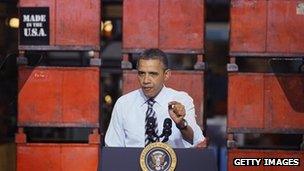Made in nostalgic America
- Published
- comments

President Obama sounded fired up in Milwaukee, telling the crowd, "Manufacturing is coming back!"
He spoke of "three proud words" - Made in America - and promised "an economy made to last - an economy based on American manufacturing".
It had me wondering if this was an economic strategy or nostalgic self-indulgence.
The nostalgia would be understandable. The world recognised America was the coming superpower when its steel production outstripped the rest of the world in 1900.
Henry Ford not only invented modern industrial production; his cars unleashed mass mobility and with it, a new American dream. Industrial might cemented America's superpower status, churning out ships, planes, guns and tanks to win World War Two.
In peacetime, manufacturing jobs provided a ticket to prosperity and the bigger cars, refrigerators and washing machines that went with it, and that made America the envy of the world.
Rising powers
The president's insistence is partly a riposte to the decline of this dream. For some, China is today what America once was: a rising and vigorous power. So the visit by China's heir apparent, Xi Jinping, cannot pass without a subliminal political commentary from the president.
The destinies of the world's two most powerful countries are interwoven and the need for friendship and understanding is strong. But Obama can't afford to be seem as a soft touch, in hock to the Middle Kingdom for the national debt.
His visit to Masterlock in Milwaukee is because that company has relocated jobs back to America from China.
He stressed that the Chinese shouldn't be allowed to get away with unfair trade practices and that companies should get tax breaks for staying in America rather than relocating abroad.
That might sound more like retrenchment than global expansion but it has an appeal. Manufacturing currently makes up about 12% of the American economy.
Making things can make sense. When many in Britain were convinced that the future lay in banking and services, Germany clung on to its manufacturing industry.
It is the source of the country's strength and ability to weather the European crisis. But as Steve Evans explains in this excellent article, there are particular conditions that make it so successful.
Factory production figures out today suggest America's manufacturing industry is recovering, as does some data from the New York Fed.
Manufacturing's political value
But not everyone thinks building America's future on manufacturing makes sense.
Obama's own former economic advisor Christina Romer isn't convinced it makes much sense, arguing haircuts and healthcare are as valuable as "making things".
Others dismiss this, saying that while manufacturing may never return to its old heights, it is still the bedrock of prosperity.
But this could also be an appeal to voters who have gone awol. The people who work in America's factories used to be the stalwarts of the Democratic party.
Now that the Democrats are reckoned to have all but lost the white working class, Obama is telling them that they are a vital part of America's future.
Whether or not making things can put the American economy back on track, talking about making things appeals to patriotic pride and makes political sense.